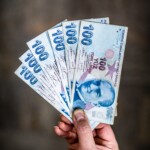‘Serious Turkey watchers understood that there would be a lot of Turkey-related drama going into the NATO summit. That’s because the summit offered a major opportunity for Erdoğan to pursue his long-term project of establishing Turkish independence and power.’
Not long after the NATO summit in Vilnius, Lithuania, concluded earlier this month, I attended a gathering at a friend’s house in the Washington, D.C., suburbs. As I stepped into the dining room where friends were drinking beer and devouring steamed crabs, one of them shouted, “There you are!” and asked me, “Can you explain to me what Erdoğan did in Vilnius?” I promptly turned around and left the room. It was a Sunday, and I had been answering questions about Turkey and the NATO summit for weeks.
It is easy to understand why folks are stumped by what Turkish President Recep Tayyip Erdoğan and his government wanted. Ahead of the summit, the Turkish leader told U.S. President Joe Biden that Ankara needed a statement of support from its NATO allies for Turkey’s long-dormant bid to join the European Union before Erdoğan would accede to the Swedish effort to join the Atlantic alliance.
This came after a year of negotiations during which democratic Sweden changed its laws in accordance with the wishes of nondemocratic Turkey to secure Erdogan’s support.
Ankara’s demand was a surprise to almost everyone, including Biden, but not long after arriving in Vilnius, the Turks surprised everyone again when they signaled agreement to Sweden’s NATO membership. At the same time, European Council President Charles Michel tweeted that he and Erdogan had met and “explored opportunities” to bring EU-Turkey “cooperation back to the forefront & re-energise our relations.”
Erdoğan was not done, however. Almost as soon as the summit ended, the foreign-policy spokesperson for Turkey’s ruling Justice and Development Party (AKP) seemed to back away from Sweden’s membership, suggesting that Turkey had not actually agreed to what everyone believed it had. Regardless, Swedish membership would have to wait until the Turkish Grand National Assembly convened in October.
To the casual observer, all of this zigzagging before, during, and after the NATO summit likely seemed bewildering, and perhaps indicative of a mercurial leader or a chaotic foreign policy. But the reality is that throughout the Erdoğan era, Turkey has been consistent in its pursuit of three basic foreign-policy ideas: strategic independence, power, and prosperity.
This is hardly earth-shattering—after all, these are attributes that pretty much all countries want. But with all the changes that Erdoğan has engineered during his 20 years in power, it has been hard to discern a strategy in what seemed to be purely domestic politics-driven incoherence.
Yet strip out the details of the four phases of Turkish foreign policy under Erdoğan, and it becomes clear that the leader knows where he wants to take Turkey—he has just been experimenting with the best way to get there.
There have been four overlapping phases of Turkish foreign policy since the AKP came to power in November 2002, starting with an emphasis on EU membership. Ankara then shifted from Europe to position Turkey as a Middle Eastern power. Yet, after boldly seeking to lead the region, Turkey’s strategic position changed radically in 2013.
The result was almost of a decade of tension between Turkey and other Middle Eastern powers, during which Erdoğan and the AKP represented Turkey as the one principled actor in the region in pursuit of democracy and stability. That, in turn, led to the most recent phase of rapprochement within the region and a deliberate balancing between the United States and Russia.
In phase one, Erdoğan and the AKP sought to achieve their goals through EU membership. There is a fierce debate among analysts about whether Erdogan and the party were serious about joining the bloc, but it is not hard to see how membership would enhance Turkish prosperity, power, and independence.
Prosperity generally comes with EU membership, which was why so many Turks supported the AKP’s constitutional and legal reforms of 2003 and 2004 that were intended to bring Turkey in line with EU standards even before joining the bloc. They just had to look across the Aegean at Greece to understand the economic benefits associated with joining the EU. Sure, Greece experienced a wrenching financial crisis in the 2010s, but even so, its GDP per capita is double that of Turkey. If Turkey were to become a member of one of the world’s most exclusive clubs, it would also expand Ankara’s global power and prestige.
When it comes to advancing Turkey’s foreign-policy independence, the argument about EU membership is a bit tricky. After all, becoming a member of the bloc requires states to sacrifice some sovereignty to supranational institutions.
Still, EU membership would put Turkey on par with the major powers in Europe, such as the United Kingdom (at the time a member), France, and Germany, which often pursue independent foreign policies.
Turkey’s EU accession came to a quick end due to European opposition and Turkish ambivalence. This led to a shift in Ankara’s pursuit of independence, power, and prosperity.
Erdoğan and the AKP were already interested in playing a prominent role in the Middle East, but they became more active after 2005, when the prospect of EU membership faded. Ankara positioned itself as a regional troubleshooter, problem-solver, and truth-teller, especially when it came to Israel’s conduct in the Gaza Strip.
This phase in Turkish foreign policy culminated in April 2012, when then-Foreign Minister Ahmet Davutoglu told parliamentarians: “We will continue to be the master, the leader, and servant of the new Middle East … and a new zone of peace, stability, and prosperity will emerge around Turkey.”
For a time, Erdoğan was successful. Turkey and the Turkish president himself were popular in the region, especially as Ankara became closely associated with the Palestinian cause. The foreign-policy community in Washington buzzed with talk of the so-called Turkish model, which demonstrated that the accumulation of Islamist political power could be consistent with democracy and economic development. There were even discussions of establishing a partnership between Turkey’s development agency and the United States to help foster the prosperity that officials and analysts believed was critical to building more just, open, and democratic societies in the Arab world. This partnership was important because regional experts believed that Ankara possessed prestige in the Middle East that Washington had long ago squandered.
But Turkey suffered a series of setbacks in the region not long after Davutoğlu appeared at the Grand National Assembly. The Turks had told their U.S. interlocutors that they had special insight into the region because of the cultural affinity that their common religion and Ottoman legacies afforded, but they overplayed their hand and misread the room. Even if many in the Arab world admired Erdogan and the AKP, they did not want Turkey to be the master or leader of the Arab Middle East.
Then, in early July 2013, Egypt’s military overthrew Egyptian President Mohamed Morsi after a tumultuous yearlong tenure. Erdogan and the AKP had invested heavily in Morsi, a Muslim Brotherhood apparatchik, and were outraged at Saudi and Emirati encouragement—as well as U.S. acceptance—of the putsch.
The result was another shift in Turkish foreign policy. Turkey would now seek strategic independence, power, and prosperity by setting itself apart from the region it has previously sought to lead.
Turkey gave refuge to Muslim Brotherhood leaders and other Egyptian dissidents and let them set up shop, undermining Egyptian strongman and coup leader Abdel Fattah al-Sisi. Ankara also became the patron of the internationally recognized government in Libya, which the Saudis, Egyptians, and Emiratis opposed. Erdoğan continued to back the Palestinians, and in particular Hamas, whom the Turkish authorities allowed to run operations against Israel from offices in Turkey. And, of course, Ankara played a prominent role in exposing Saudi Crown Prince Mohammed bin Salman’s culpability in the murder of Washington Post columnist Jamal Khashoggi.
In all of this, Erdoğan and the AKP could fairly claim that their foreign policy was one of principle, which may have garnered them the enmity of governments in the region but only enhanced their prestige among their people. In doing so, Erdoğan underscored Turkey’s independence from the U.S.-led strategic order whose most prominent members—the United Arab Emirates (UAE), Saudi Arabia, Egypt, and Israel—were on the other side of the region’s conflicts and controversies. Despite the deterioration of Ankara’s relations with some of the Middle East’s most important countries, trade remained robust with some of them—including, notably, Israel and Egypt.
By 2021, though, the limits of Turkey’s approach to the Middle East became clear, even if it had enhanced the country’s prestige and Ankara’s own sense that it was rightfully a Mediterranean, Middle Eastern, and Muslim power.
A coalition of Egypt, Greece, Cyprus, Israel, France, the UAE, and Saudi Arabia came together to oppose the exercise of Turkish power. Part of this counterbalancing effort came in the form of the Eastern Mediterranean Gas Forum, the core of which was Egypt, Greece, Cyprus, and Israel. In many ways, the forum was ad hoc multilateral security coordination masquerading as economic cooperation.
Sure, there is a lot of gas to exploit in the area and incentives for regional cooperation in bringing it to market, but it was hard not to notice the Saudi, Emirati, Israeli, and Greek air forces exercising together in Mediterranean skies while the French navy patrolled waters near Cyprus.
Isolated and beset with a self-inflicted currency crisis, Erdoğan managed another change in Turkish foreign policy—ushering in the current phase. He decided that quarreling with the Middle East was no longer worth the cost and that rapprochement with the Saudis, Emiratis, Israelis, and Egyptians might bring investment from the Persian Gulf and better relations with Washington.
Erdoğan may have changed course on the Middle East, but he remained consistent in his approach to Russia, which is also derived from his desire to establish Turkey’s independence and enhance its prestige. After Russian President Vladimir Putin ordered his troops into Ukraine in late February 2022, Erdogan said all the right things about supporting Ukrainian sovereignty and sold Kyiv important military equipment, but Ankara did not let Russia’s blitz disrupt bilateral ties with Moscow.
That helped Turkey negotiate the Black Sea Grain Deal between Russia and Ukraine, as well as Ankara’s effort to reverse the economic damage that Erdoğan’s unorthodox economic problems caused. Ankara never embraced Western sanctions on Moscow, instead allowing Turkish firms to step in and take the place of departed Western ones and permitting Russian oligarchs to acquire Turkish residency and invest in the country.
All of which brings us back to Vilnius. Serious Turkey watchers understood that there would be a lot of Turkey-related drama going into the NATO summit. That’s because the summit offered a major opportunity for Erdoğan to pursue his long-term project of establishing Turkish independence and power.
Erdoğan (and his opposition) do not want Turkey to be treated merely as a security asset on Europe’s southeastern flank. If Erdoğan could hold up NATO’s expansion long enough to extract a commitment from Biden to provide Turkey with new F-16s as well as convince EU leaders to renew cooperation with Turkey, which could potentially lead to an enhanced customs union agreement—and then be hailed as a statesman after agreeing to Sweden’s NATO membership, the Turkish leader could fairly declare “mission accomplished.”
And that’s exactly what he did.
This article was originally published in Foreign Policy.
The views and opinions expressed above are the author’s and do not reflect those of the Free Turkish Press.


